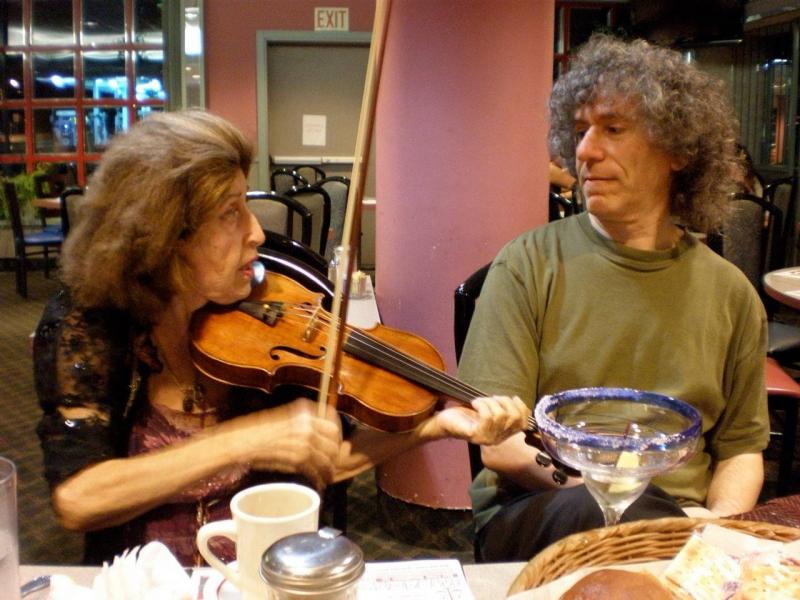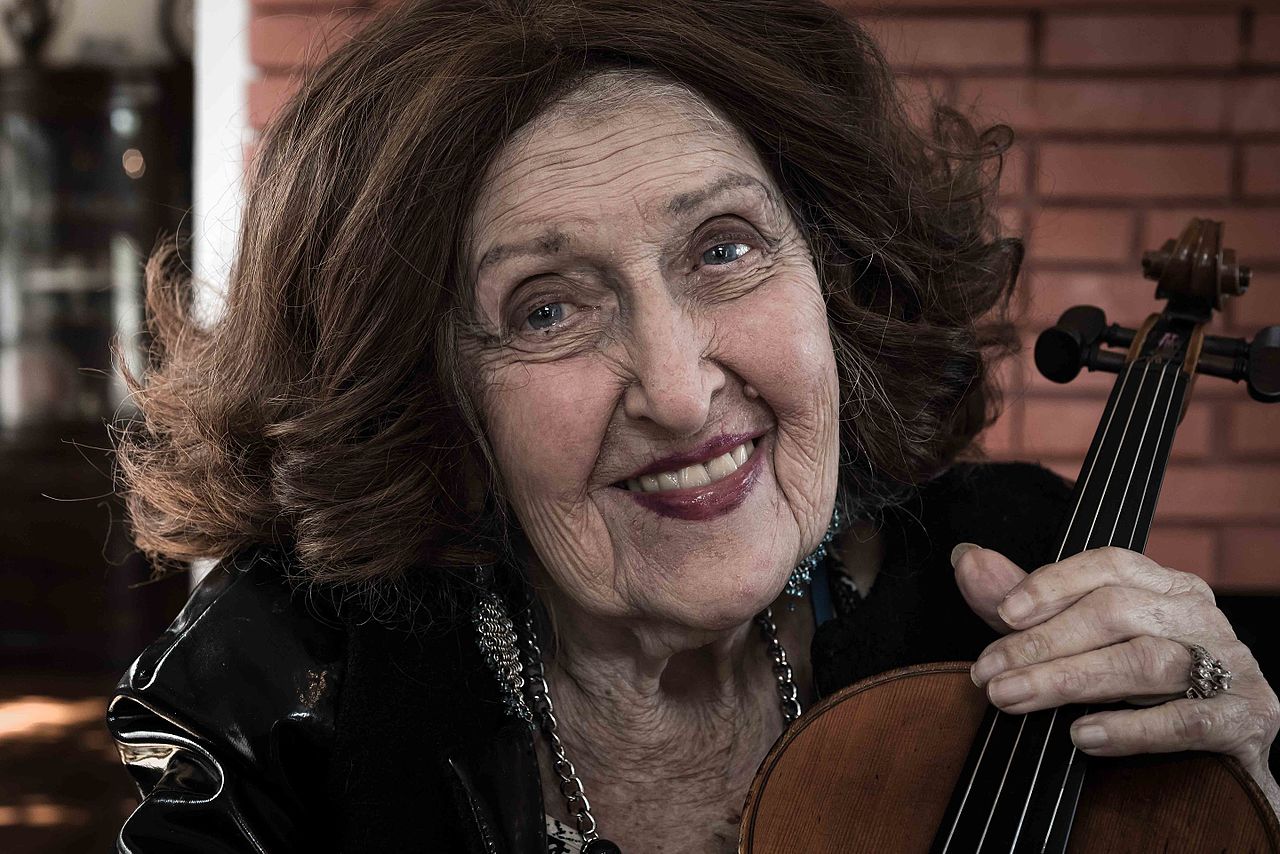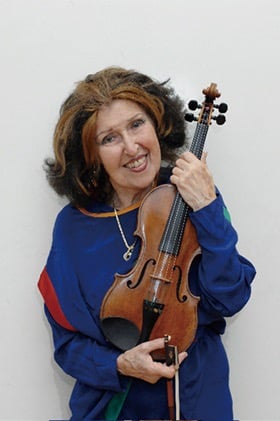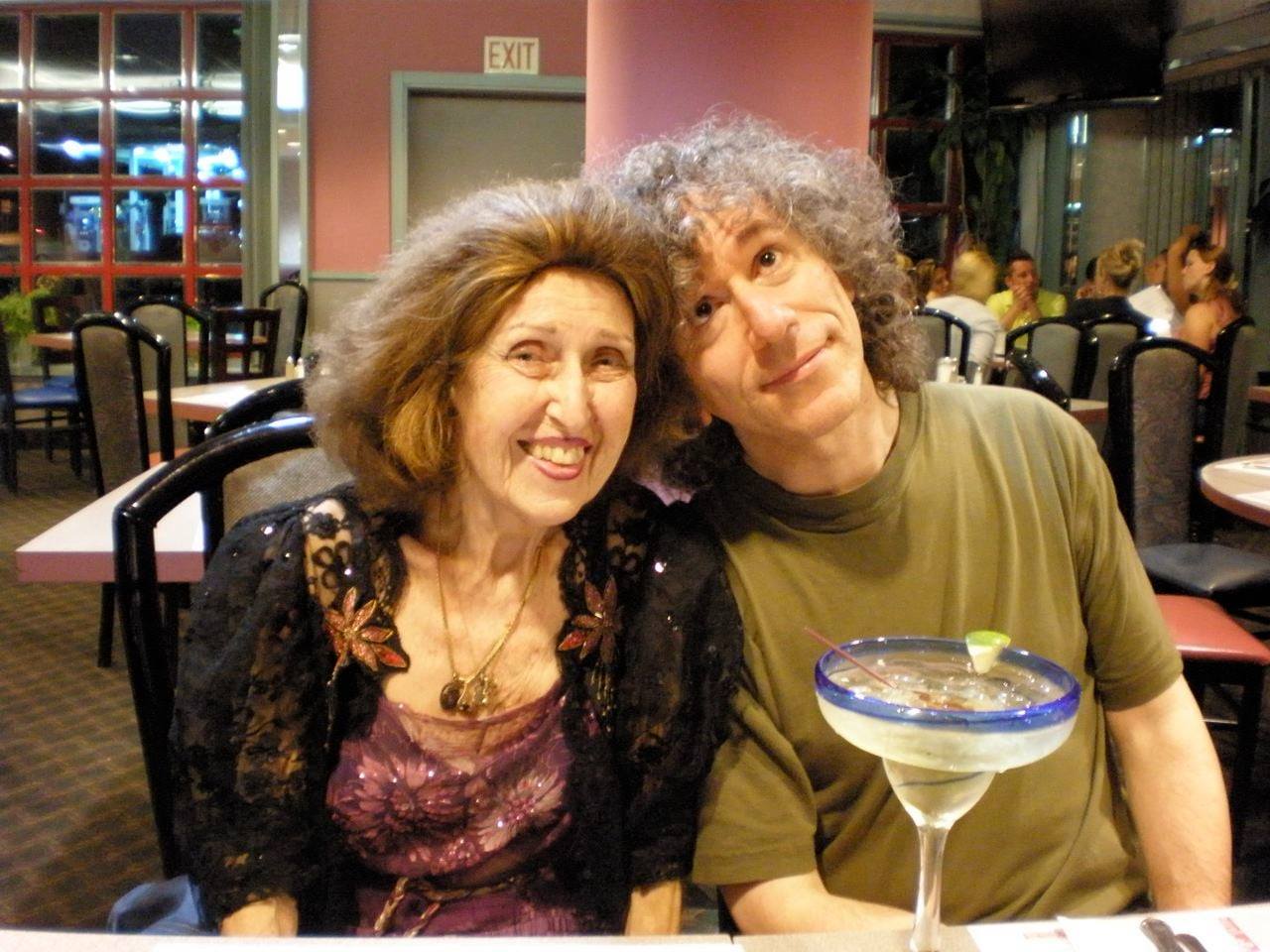'She spoke through her violin': Steven Isserlis on extraordinary meetings with Ida Haendel (192?-2020) | reviews, news & interviews
'She spoke through her violin': Steven Isserlis on extraordinary meetings with Ida Haendel (192?-2020)
'She spoke through her violin': Steven Isserlis on extraordinary meetings with Ida Haendel (192?-2020)
One great and characterful instrumentalist remembered by another

So Ida has left us – a legend has departed. What a violinist! What a woman! Magnificent, unique, incorrigible – she was a law unto herself.
First, the playing: a film about her was aptly entitled: “I AM the Violin.” And she was! The violin was her life; she mastered it, devoted so much of her existence to it, cared so much about it. Every performance was an event, which she took absolutely seriously, giving each concert her all. She spoke through her violin, proved herself through it, lived within the music she made. She was a marvel, an icon; each note she played was the result of total conviction – and as a consequence was totally convincing. She had been groomed from the beginning to be a star – and a star she was.
But she was also an adorable person. I had heard of her, of course, from my childhood onwards – hadn’t everybody? But I didn’t meet her until – I think – 2000, when I attended a memorable recital she gave at the Wigmore Hall (apparently her debut there!), concluding with a magisterial performance of Enescu’s Third Sonata. I’d heard, to my delight, that she’d heard me somewhere, and had liked it, so I dared to go backstage afterwards. Having enthused about her playing, I rather uncertainly told her that I was Steven. She looked at me disbelievingly. “You’re NOT,” she announced, in her wonderful deep voice. I assured her that I certainly had been last time I looked in the mirror. She accepted this, and proposed that we play the Brahms Double Concerto together. It was such an honour; but alas, I just couldn’t do the dates she suggested.  I came across her shortly thereafter, however, at the Verbier Festival. I’d seen that she was giving masterclasses there, so when I saw her, I asked how they were going. She looked at me severely. “Steven,” she boomed, wagging her finger. “I don’t teach.” I was puzzled; she was, after all, advertised as the teacher of the violin class. “So you like teaching?” I said, provoking her. The finger wagged again. “Steven,” she repeated with equal seriousness, “I don’t teach.” “So how’s the teaching going?” I asked. Her finger was on its way in my direction, and she’d started to say my name in the same tone of voice – when suddenly her face broke into a big smile. “Oh – so you’re a tease,” she said. After that, we got on famously. My other main memory of that Verbier encounter was of her examining something – I couldn’t see what – in the hotel lobby, and then calling me over. It turned out that the object in her hands was an album of recent photos of her. “Look, Steven,” she commanded urgently. “Don’t I look gorgeous?”
I came across her shortly thereafter, however, at the Verbier Festival. I’d seen that she was giving masterclasses there, so when I saw her, I asked how they were going. She looked at me severely. “Steven,” she boomed, wagging her finger. “I don’t teach.” I was puzzled; she was, after all, advertised as the teacher of the violin class. “So you like teaching?” I said, provoking her. The finger wagged again. “Steven,” she repeated with equal seriousness, “I don’t teach.” “So how’s the teaching going?” I asked. Her finger was on its way in my direction, and she’d started to say my name in the same tone of voice – when suddenly her face broke into a big smile. “Oh – so you’re a tease,” she said. After that, we got on famously. My other main memory of that Verbier encounter was of her examining something – I couldn’t see what – in the hotel lobby, and then calling me over. It turned out that the object in her hands was an album of recent photos of her. “Look, Steven,” she commanded urgently. “Don’t I look gorgeous?”
Later, we took her to dinner near her flat in London. Tottering through the streets in her high heels, she suddenly came to a stop in front of a (closed) clothes shop, where either a pair of gold shoes or a gold dress (I can’t remember which) had caught her eye. It was impossible to budge her, late though we were for the restaurant. “Wouldn’t I look wonderful in that?” she asked us challengingly. We agreed that she would. “I’m coming back here tomorrow morning,” she assured us. She spoke that night about her appearance. “You think I dress like this just to go out?” she asked. “No! Catch me at breakfast – I’ll look just the same.” Her pride in her appearance was never-changing. Perhaps in someone else it could have been too much – but with Ida, it was wonderful, admirable; life-affirming, in fact, like her pride in her playing.
 It is funny that already I’ve seen two obituaries giving her age five years apart. She’d certainly have preferred the younger estimate… It was impossible to get the truth out of her. I remember asking another glorious violinist-character, Lorand Fenyves, whether he knew Ida. “Oh yes, of course!” he replied. “I knew her when I was 16 and she was 15.” He paused. “And now I’m 80 and” – his eyes twinkled – “she’s 55!”
It is funny that already I’ve seen two obituaries giving her age five years apart. She’d certainly have preferred the younger estimate… It was impossible to get the truth out of her. I remember asking another glorious violinist-character, Lorand Fenyves, whether he knew Ida. “Oh yes, of course!” he replied. “I knew her when I was 16 and she was 15.” He paused. “And now I’m 80 and” – his eyes twinkled – “she’s 55!”
Although we never got to play the Brahms Double together, we did perform the Beethoven Triple Concerto with Martha Argerich and the Rotterdam Philharmonic under the then little-known Yannick Nézet-Séguin in (I think) 2006. Now THAT was an experience – to put it rather mildly… Playing with those two way-larger-than-life ladies was something not to be forgotten; the two adored each other, and it was great fun to witness their interaction. Ida had only played the piece once before, as I remember; but she played it with utter conviction. And Martha was – well, Martha. And Yannick kept the whole thing together, somehow. So – it was special…
It was supposed to happen again, in Miami (where Ida lived); but alas, it didn’t. Still, I kept in touch with Ida and on one memorable occasion got to interview her at the Wigmore Hall (there’s a recording of that occasion on YouTube – see below). She also came down to Prussia Cove [the epicentre of musical masterclasses] once for three days, her visit culminating in a breathtaking account of the Bach Chaconne (she sported an almost equally breathtaking dress to match!) at the Hall for Cornwall.
We also played and taught/didn’t teach together in 2010 at the Summit Music Festival, just outside New York. That was another unforgettable experience. At the concert that concluded the festival, Ida played virtuoso pieces with the orchestra that would have been impressive in someone 30 years younger – even younger – than she was. But equally Ida-ish was the post-concert experience. For some reason, it got very late, and it was well after midnight when we were taken in search of food. Not surprisingly, there were few options in the countryside at that time of night; but eventually we found a 24-hour diner.  We went in and occupied a table (pictured above). Looking around at the bikers and other rather unpredictable-looking types, I was a tad nervous; not Ida. I fortified myself with a margarita; she had tea. At one point, the conversation turned to Schumann, and his Second Violin Sonata (which at that time I didn’t know very well). I asked a question about it. “You want to hear how it goes?” Ida demanded to know. She strode over to her violin-case, pulled out the violin, and to the astonishment (and then, luckily the delight) of the assembled company, began to play it. A photo taken at the time (main picture) shows me a little less than comfortable – and her absolutely in her element.
We went in and occupied a table (pictured above). Looking around at the bikers and other rather unpredictable-looking types, I was a tad nervous; not Ida. I fortified myself with a margarita; she had tea. At one point, the conversation turned to Schumann, and his Second Violin Sonata (which at that time I didn’t know very well). I asked a question about it. “You want to hear how it goes?” Ida demanded to know. She strode over to her violin-case, pulled out the violin, and to the astonishment (and then, luckily the delight) of the assembled company, began to play it. A photo taken at the time (main picture) shows me a little less than comfortable – and her absolutely in her element.
Oh, Ida. By the last time I spoke to her – too long ago, but not that long ago – I’d heard that she’d become very forgetful, so wasn’t quite sure whether to call her or not. But I dialled anyway, and the phone was answered. “Hello, Ida?” “Who is it?” “It’s Steven – Steven Isserlis.” Silence – then the phone went dead. Oh dear. I tried again. This time I was able to hold her attention long enough to remind her who I was. We started to talk, and as the conversation progressed, she evidently remembered more and more about our friendship. It was true that she repeated herself a lot; but still – she was very much Ida, the same wonderful voice, the same love of life.
And now she’s gone. Farewell, Ida the legend; we humanoids will miss you – but thank you, thank you for giving us so much. Everything, in fact.
Steven Isserlis interviews Ida Haendel at the Wigmore Hall
- This homage originally appeared on Steven Isserlis's Facebook page
- Read classical reviews on theartsdesk
Explore topics
Share this article
The future of Arts Journalism
You can stop theartsdesk.com closing!
We urgently need financing to survive. Our fundraising drive has thus far raised £49,000 but we need to reach £100,000 or we will be forced to close. Please contribute here: https://gofund.me/c3f6033d
And if you can forward this information to anyone who might assist, we’d be grateful.

Subscribe to theartsdesk.com
Thank you for continuing to read our work on theartsdesk.com. For unlimited access to every article in its entirety, including our archive of more than 15,000 pieces, we're asking for £5 per month or £40 per year. We feel it's a very good deal, and hope you do too.
To take a subscription now simply click here.
And if you're looking for that extra gift for a friend or family member, why not treat them to a theartsdesk.com gift subscription?
more Classical music
 First Person: Manchester Camerata's Head of Artistic Planning Clara Marshall Cawley on questioning the status quo
Five days of free events with all sorts of audiences around Manchester starts tomorrow
First Person: Manchester Camerata's Head of Artistic Planning Clara Marshall Cawley on questioning the status quo
Five days of free events with all sorts of audiences around Manchester starts tomorrow
 Goldscheider, Brother Tree Sound, Kings Place review - music of hope from a young composer
Unusual combination of horn, strings and electronics makes for some intriguing listening
Goldscheider, Brother Tree Sound, Kings Place review - music of hope from a young composer
Unusual combination of horn, strings and electronics makes for some intriguing listening
 theartsdesk Q&A: composer Donghoon Shin on his new concerto for pianist Seong-Jin Cho
Classical music makes its debut at London's K-Music Festival
theartsdesk Q&A: composer Donghoon Shin on his new concerto for pianist Seong-Jin Cho
Classical music makes its debut at London's K-Music Festival
 Helleur-Simcock, Hallé, Wong, Bridgewater Hall, Manchester review - moving lyricism in Elgar’s concerto
Season opener brings lyrical beauty, crisp confidence and a proper Romantic wallow
Helleur-Simcock, Hallé, Wong, Bridgewater Hall, Manchester review - moving lyricism in Elgar’s concerto
Season opener brings lyrical beauty, crisp confidence and a proper Romantic wallow
 Kohout, Spence, Braun, Manchester Camerata, Huth, RNCM, Manchester review - joy, insight, imagination and unanimity
Celebration of the past with stars of the future at the Royal Northern College
Kohout, Spence, Braun, Manchester Camerata, Huth, RNCM, Manchester review - joy, insight, imagination and unanimity
Celebration of the past with stars of the future at the Royal Northern College
 Jansen, LSO, Pappano, Barbican review - profound and bracing emotional workouts
Great soloist, conductor and orchestra take Britten and Shostakovich to the edge
Jansen, LSO, Pappano, Barbican review - profound and bracing emotional workouts
Great soloist, conductor and orchestra take Britten and Shostakovich to the edge
 Jakub Hrůša and Friends in Concert, Royal Opera review - fleshcreep in two uneven halves
Bartók kept short, and a sprawling Dvořák choral ballad done as well as it could be
Jakub Hrůša and Friends in Concert, Royal Opera review - fleshcreep in two uneven halves
Bartók kept short, and a sprawling Dvořák choral ballad done as well as it could be
 Hadelich, BBC Philharmonic, Storgårds, Bridgewater Hall, Manchester review - youth, fate and pain
Prokofiev in the hands of a fine violinist has surely never sounded better
Hadelich, BBC Philharmonic, Storgårds, Bridgewater Hall, Manchester review - youth, fate and pain
Prokofiev in the hands of a fine violinist has surely never sounded better
 Monteverdi Choir, ORR, Heras-Casado, St Martin-in-the-Fields review - flames of joy and sorrow
First-rate soloists, choir and orchestra unite in a blazing Mozart Requiem
Monteverdi Choir, ORR, Heras-Casado, St Martin-in-the-Fields review - flames of joy and sorrow
First-rate soloists, choir and orchestra unite in a blazing Mozart Requiem
 Cho, LSO, Pappano, Barbican review - finely-focused stormy weather
Chameleonic Seong-Jin Cho is a match for the fine-tuning of the LSO’s Chief Conductor
Cho, LSO, Pappano, Barbican review - finely-focused stormy weather
Chameleonic Seong-Jin Cho is a match for the fine-tuning of the LSO’s Chief Conductor
 Classical CDs: Shrouds, silhouettes and superstition
Cello concertos, choral collections and a stunning tribute to a contemporary giant
Classical CDs: Shrouds, silhouettes and superstition
Cello concertos, choral collections and a stunning tribute to a contemporary giant
 Appl, Levickis, Wigmore Hall review - fun to the fore in cabaret and show songs
A relaxed evening of light-hearted fare, with the accordion offering unusual colours
Appl, Levickis, Wigmore Hall review - fun to the fore in cabaret and show songs
A relaxed evening of light-hearted fare, with the accordion offering unusual colours

Add comment